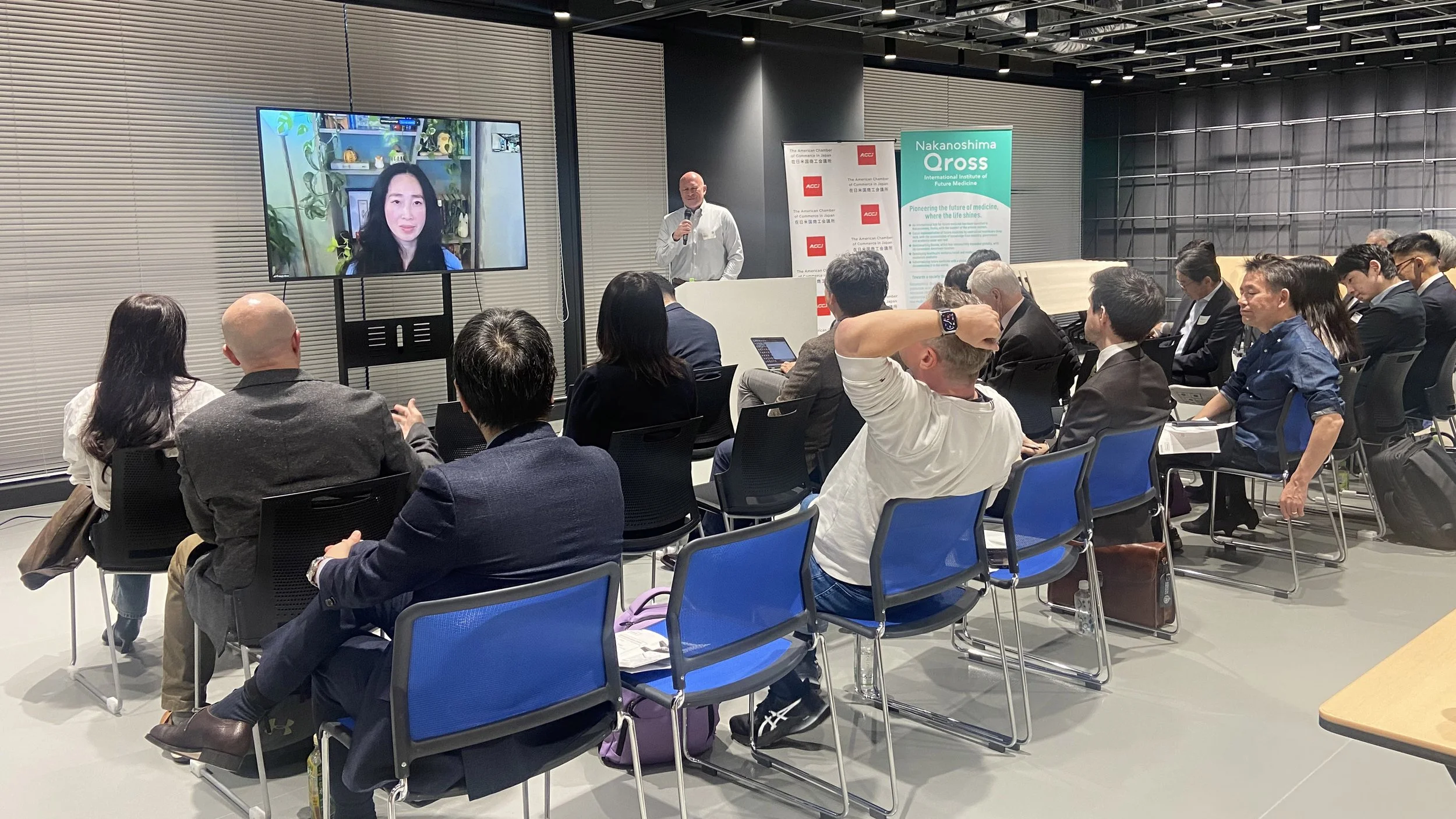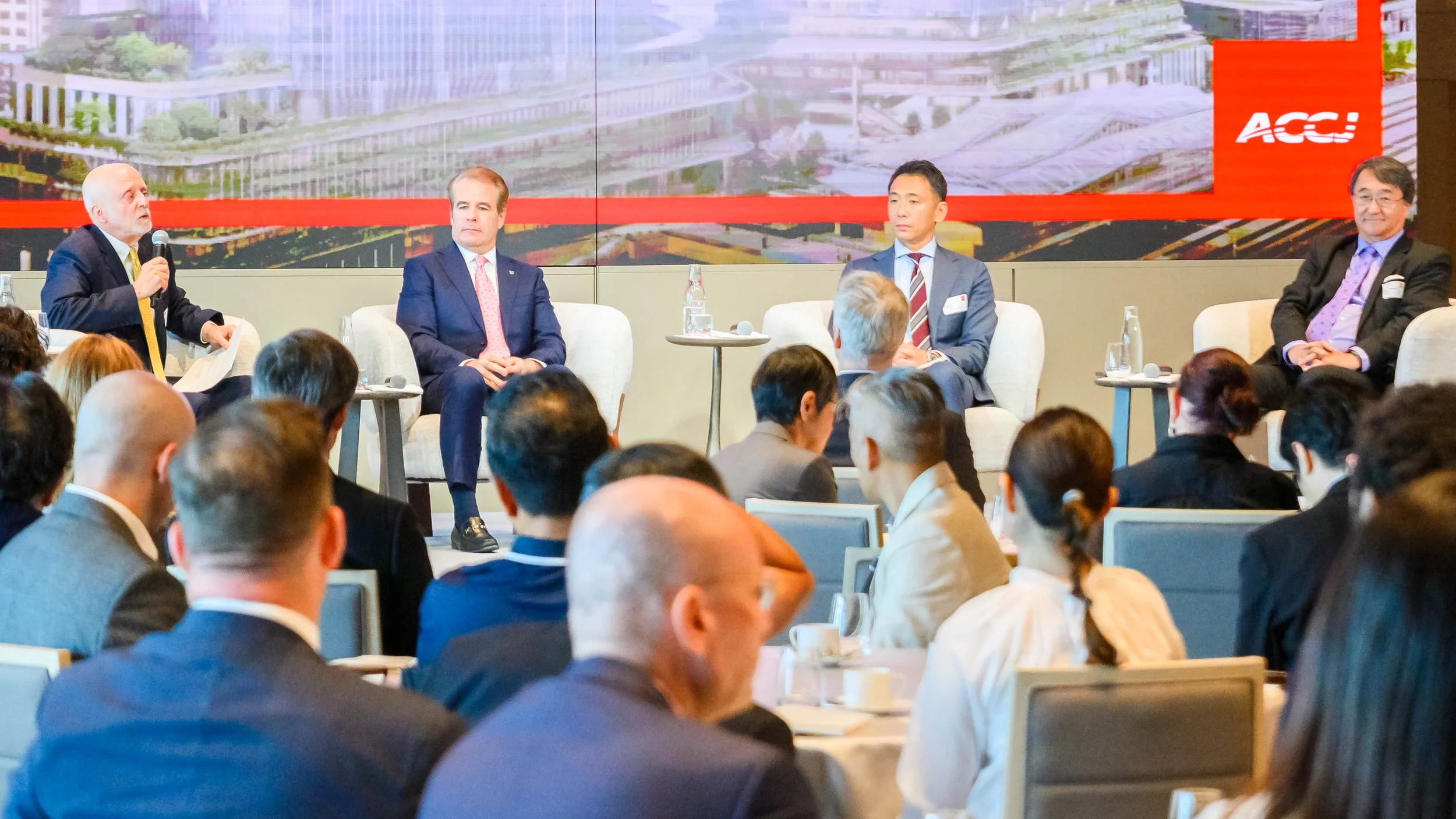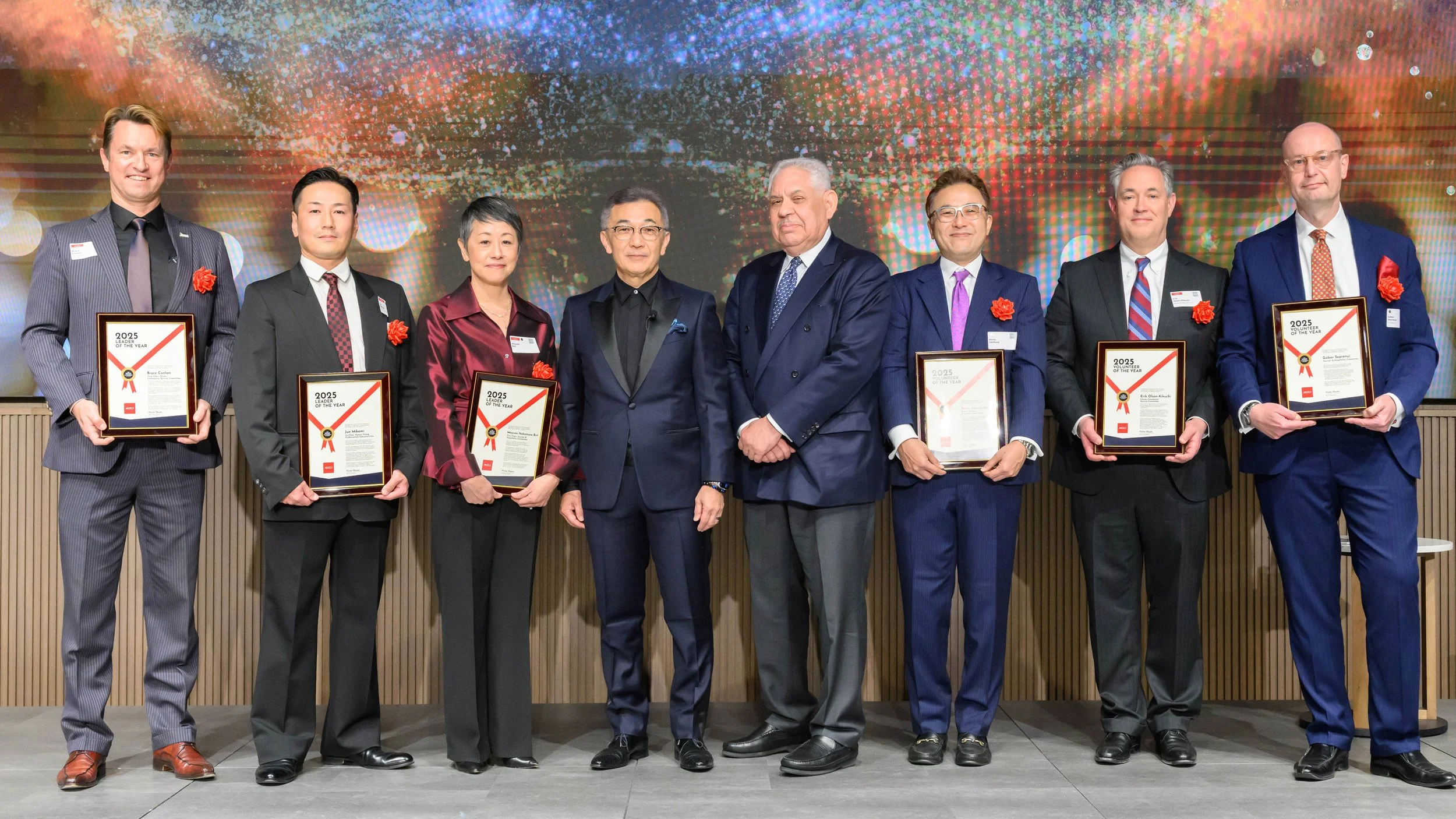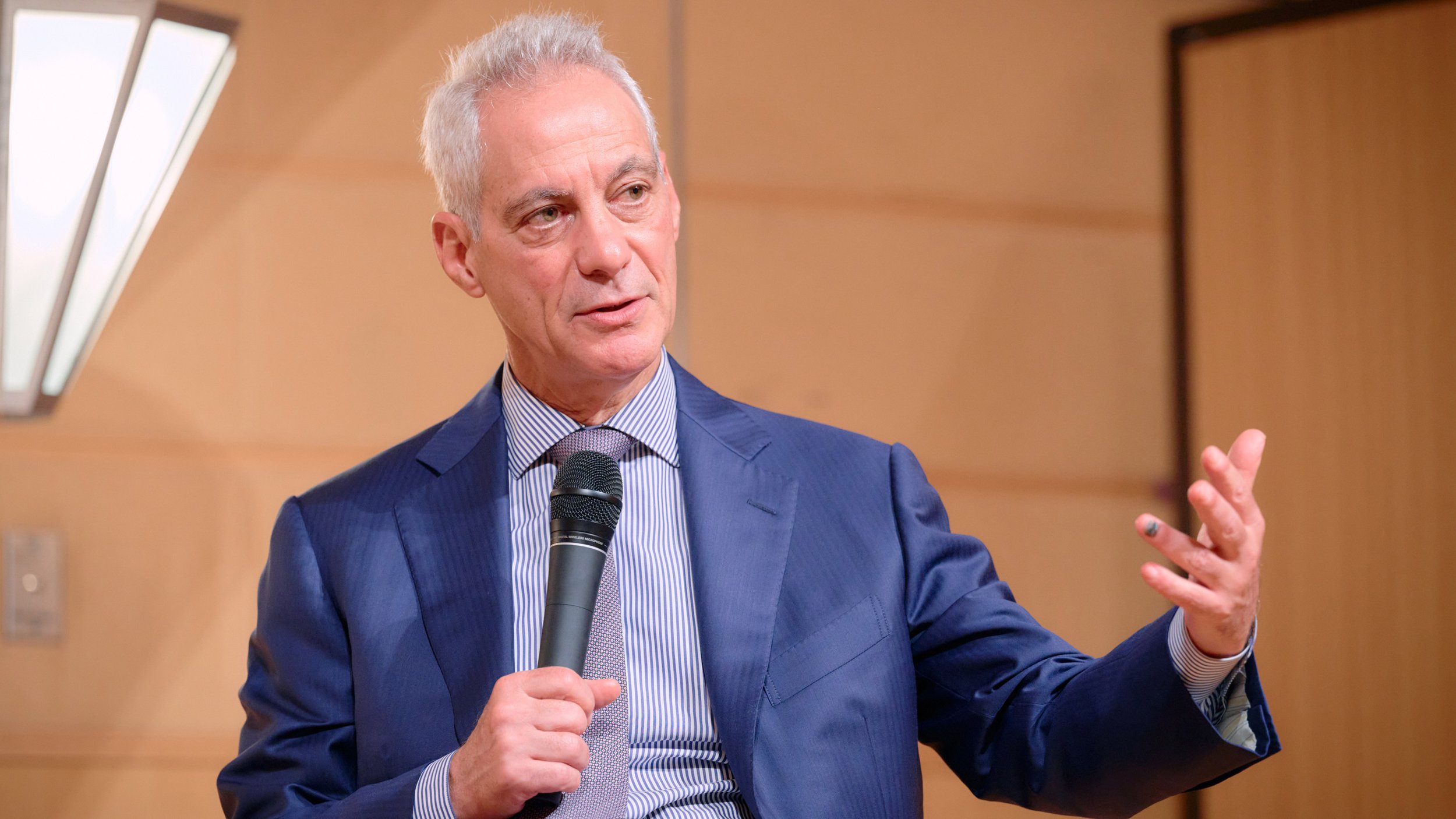Features
Members of the American Chamber of Commerce in Japan (ACCJ) and their guests gathered in the Hilton Tokyo’s Kiku Ballroom on December 11 to close out 2025 with its final signature event of the year.
The ACCJ Healthcare x Digital (HxD) initiative reached a new milestone on December 2 with its first-ever exclusive mentorship event for healthcare startups at Nakanoshima Qross in Osaka.
As arrivals boom, can the country’s hospitality industry keep pace through a new era of omotenashi? That was the question at the center of an ACCJ event hosted on October 8, featuring Tokyo Governor Yuriko Koike.
On October 10, the American Chamber of Commerce in Japan (ACCJ) recognized Ambassador William E. Grayson as the 2025 ACCJ Person of the Year. He was selected for his leadership in advancing the US–Japan partnership as commissioner general of the USA Pavilion at Expo 2025 Osaka, Kansai.
The ACCJ recognizes the 2025 Leaders and Volunteers of the Year for stellar contributions across its three chapters.
Faced with a dwindling workforce, companies in Japan are locked in fierce competition to find young talent who can carry the organization forward and inject it with fresh ideas and vitality. Many overlook an option that offers tremendous advantages for employers and students alike: internships.
Heather Kodhelaj and Leo Abufadil share how being chosen as Bishop Scholars has opened doors to their future careers.
As artificial intelligence sweeps the world, there is growing concern. Cisco is ensuring that it is powerful, efficient, and safe.
From 1970 to 2025, Osaka has played host to chamber member company opportunities and innovations. Aflac and IBM share stories past and present.
Ahead of a special event hosted by the ACCJ at Expo 2025 Osaka, Kansai, four women share how to support mindfulness in the workplace.
Lilly Japan’s Simone Thomsen reflects on six years of leading with purpose and ACCJ collaboration.
MGM’s Osaka integrated resort project, to be built adjacent to the Expo 2025 site, will be a catalyst for international hires and could spur change in immigration policy.
As the world changes, the future may depend on empowering women and amplifying their voices. The Asian University for Women‘s April fundraiser helps make education possible.
As US Ambassador to Japan Rahm Emanuel prepares to hand over the reins to a new envoy, he talks to The ACCJ Journal about the experience, the importance of the alliance, and the future.
The 20th edition of the North America–Europe Golf Challenge is set for October 4. Organized by the ACCJ, EBC, and CCCJ, the shotgun-style tournament tees up fun, food, drinks, prizes, and one of the year's best networking opportunities.
Fresh ideas and youthful energy are the lifeblood of business and international relations, and the ACCJ is dedicated to nurturing rising talent through the Young Professionals Forum.
Japan has steadily reclaimed its status as a top destination. It is no longer a question of if Japan will recover from the pandemic, but rather how it will rise to the challenge of serving up its famous omotenashi to so many visitors.
Tokyo American Club’s New York Ballroom pulsed with energy—and music—on July 2 as the American Chamber of Commerce in Japan (ACCJ) marked the 248th birthday of the United States and its own 75th.
At the start of 2024, The ACCJ Journal sat down with Victor Osumi as he took the helm as ACCJ president. As the heat of summer set in, we again joined him to gauge how the year he has dubbed one of reengagement is evolving, and where he sees the chamber amid its 75th anniversary.
As his time as the first Bishop Memorial Scholar draws to a close, we sit down with Matthew Trani to learn about the experience and how he hopes to maintain his ACCJ connections.
With an emphasis on teamwork the ACCJ Sales Support Alliance supercharges the chamber experience by bringing together members across industries to share connections, knowledge, and help one another build business success.
Rob Claar, CEO and founder of healthcare investment, development, and commercialization platform HekaBio joins us to discuss how overseas healthcare companies can gain regulatory approval in Japan and put their innovations in the hands of Japanese doctors and patients.
The ACCJ Journal sits down with ACCJ President Victor Osumi to learn more about how his career took flight, how he became involved with the chamber, and the path he sees ahead as he takes the helm for 2024.
Since the introduction of consumer-facing artificial intelligence applications such as ChatGPT and Google’s Bard, generative AI has transformed how people work around the world. How might it impact specific industries in the years to come?
Japan has detailed ambitious plans for the wider deployment of renewable energy sources throughout the economy. Yet energy experts caution that Tokyo is unlikely to reach those targets unless policy changes are made.
On November 9, 2023, the American Chamber of Commerce in Japan (ACCJ) recognized Akio Mimura as the 2022 ACCJ Person of the Year. He was chosen for his efforts to bring the Japanese and international business communities closer together during his nine years as chairman of the Japan Chamber of Commerce and Industry (JCCI).
In September 2018, the ACCJ released a viewpoint supporting marriage equality in collaboration with the Lawyers for LGBT & Allies Network (LLAN) and five other chambers of commerce. Here is where we stand today.
The ACCJ Journal sat down with CIC founder Tim Rowe in the bustling Toranomon Hills networking hub to learn more about how he went from sharing a space with friends to leading a community for entrepreneurs that includes more than 1,000 companies at centers in eight cities around the world.






























